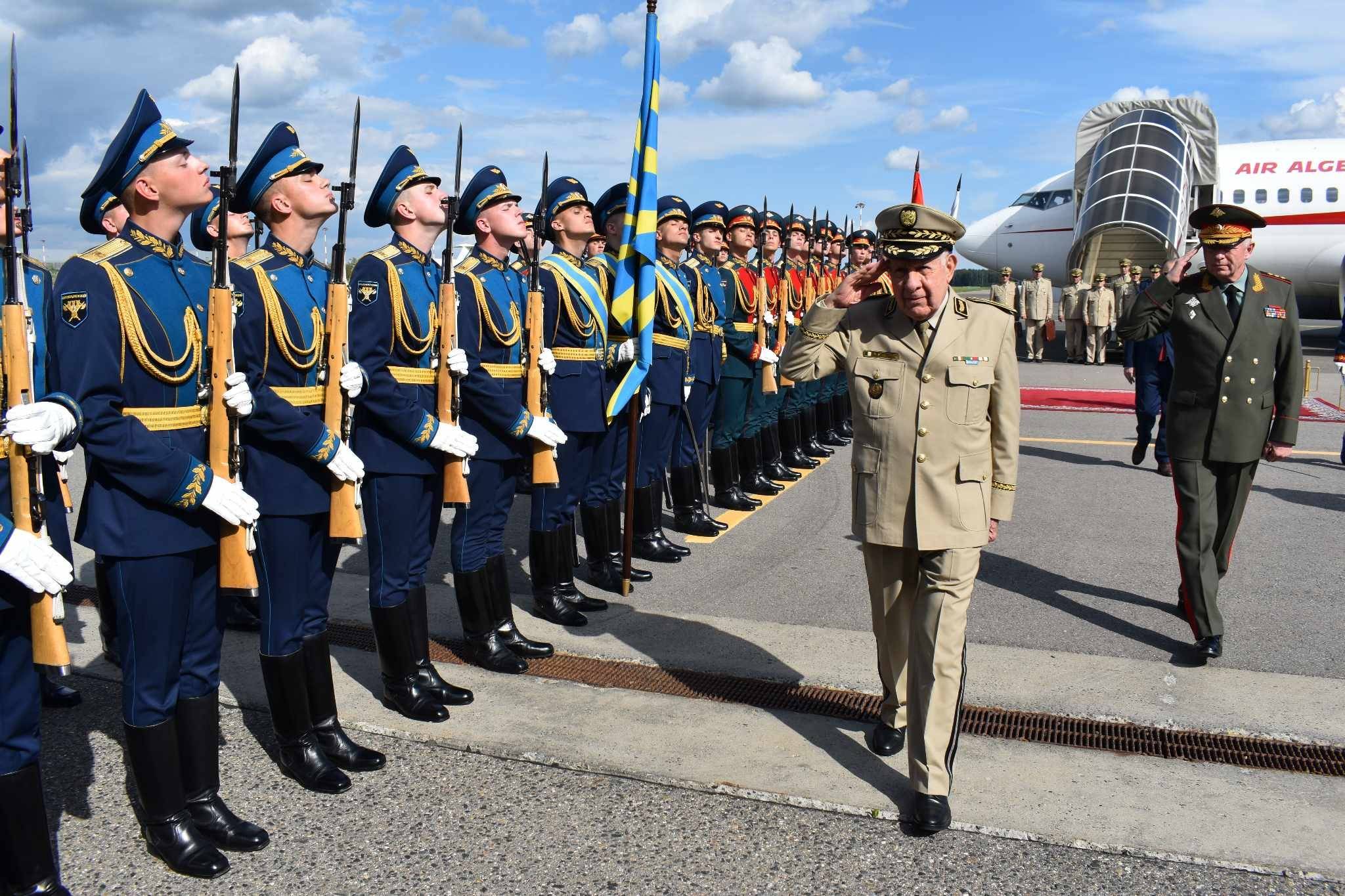The start of December witnessed a series of events showcasing Russia’s endeavors to fortify its ties with Algeria across the political, economic, and military spheres. This initiative was underscored by Russian President, Vladimir Putin, who acknowledged the positive trajectory of Russian-Algerian trade and economic relations. Putin also expressed his admiration for Algeria’s balanced approach to foreign policy during the acceptance ceremony for several new ambassadors, including the Algerian representative, held on the fourth of December in Russia.
The following day, the Algerian Ministry of Defense published the intent to hold combined maneuvers involving the Algerian and Russian naval forces, scheduled for December 8. This event coincides with the docking of the “Admiral Grigorovich” frigate, a component of the Russian Black Sea Fleet, at the port of Algiers. This occurrence is part of the bilateral military cooperation agenda shared between the two nations.
A New Phase in Russian-Algerian Relations
The relationship between Russia and Algeria has advanced to an enhanced level of collaboration that extends past the customary economic, political, and military domains that formed the basis of their relationship. This progression followed the endorsement of a document by the Russian President, Vladimir Putin, and his Algerian counterpart Abdelmadjid Tebboune, on June 15. This document fortified the strategic partnership between Russia and Algeria. The most significant aspects of this partnership are delineated below.
1- Signing the Judicial Cooperation Protocol: On November 28, the Prosecutor General of Russia, Igor Krasnov, engaged in discussions with the Algerian Minister of Justice, Abdelrachid Tabbi, culminating in the signing of a Judicial Cooperation Protocol between Algeria and Russia. This agreement delineates key areas of collaborative efforts and provides employees of the Algerian Ministry of Justice with complimentary access to Russian training activities.
Russian-Algerian judicial cooperation is within the broader context of Russia’s strategic response to the judicial prosecutions spearheaded by the US against Putin. This follows the issuance of an arrest warrant by the International Criminal Court (ICC) on March 7, accusing Putin of the forced displacement of Ukrainian children amid the conflict instigated by Russia against Ukraine, a charge that Russia has categorically denied.
The Prosecutor General of Russia proposed to the Algerian Minister of Justice that they contemplate entering into an accord with Russia regarding the non-extradition of nationals upon the request of the ICC. Prior to the formalization of this agreement, he recommended the provision of suitable reciprocal assurances. He expressed concern that the court was being manipulated by specific factions to further personal agendas, thereby contravening established principles of international law, with particular reference to the United States and its European allies.
2- Cooperation in the field of nuclear technology: The proclamation of an intensified strategic alliance between Russia and Algeria encompasses efforts to augment collaboration in nuclear technology and its non-violent applications, particularly in the medical sector, diagnostic imaging, and radioisotope production within Algeria. Algerian President, Abdelmadjid Tebboune, highlighted the potential for establishing accords with Russia to decontaminate zones in Algeria where French colonial nuclear trials were previously executed. This collaboration has gathered pace, with Algeria demonstrating a keen interest in advancing nuclear technologies for medical, industrial, and agricultural objectives.
The Russian Federation and the People’s Democratic Republic of Algeria are poised to intensify their collaborative efforts in nuclear technology, to secure reciprocal advantages. The emphasis of this collaboration is on broadening the scope of cooperation in nuclear research and development. The two nations intend to inaugurate joint research facilities to augment nuclear technology and investigate novel applications. Concurrently, on September 26, during the 67th General Conference of the International Atomic Energy Agency, a Memorandum of Understanding was signed between Rosatom, a Russian state corporation, and the Algerian Atomic Energy Authority. This agreement pertains to the execution of shared projects in the domain of nuclear medicine, with both parties consenting to undertake cooperative ventures in this field. The exploration of non-energy nuclear technologies within the healthcare sector, coupled with the advancement of nuclear medicine in Algeria, signifies a pivotal development. Concurrently, Algeria’s burgeoning interest in fortifying collaboration with Russia in the realm of nuclear energy, specifically for energy production, underscores the potential future trajectory of this sector.
The collaborative endeavor in nuclear safety and security continues to be of paramount importance for both nations, to guarantee the secure and accountable application of nuclear technology in Algeria. The cultivation of nuclear human capital and the enhancement of a proficient workforce in nuclear technology are pivotal to the realization of Algeria’s nuclear aspirations.
3- Supporting relations in the education sector: Algeria and Russia are endeavoring to fortify their collaborative efforts in the realm of education and skills enhancement. This encompasses student exchange initiatives, collaborative research endeavors, and training schemes across a spectrum of disciplines, including engineering, technology, and science. On the 8th of September, Abdelhakim Belabed, the Algerian Minister of Education, engaged in dialogues with Denis Gribov, the Russian Deputy Minister of Education, regarding strategies to augment cooperation in the educational sector between the two nations. The Algerian minister elucidated that collaboration with Moscow in the educational sphere will augment scientific proficiency and facilitate the exchange of knowledge, during a period when the Algerian government is prioritizing the development of scientific and technical specializations.
In the context of broadening Algerian-Russian academic collaboration, a Russian language teaching center has been inaugurated at the University of Algiers 2, “Abu al-Qasim Saadallah”, in partnership with the Russian State Pedagogical University. This enhancement of cooperation in the educational sector aligns with the declaration of Russian President Putin, in his discourse with Algerian President Tebboune on June 15, to augment the enrollment of Algerian students in Russian universities by one-third.
4- Implementing joint projects in space technology: The nations of Algeria and Russia are endeavoring to enhance their collaborative efforts in the realm of space technology. Russia has proffered the idea of collaborative initiatives in the domain of satellite
On the 19th of June, a collaboration pact was formalized between Algeria and Moscow, focusing on the peaceful exploration and utilization of outer space. This agreement encompasses the training and knowledge transfer in space-related fields, as well as the international legal regulation of space activities. Subsequently, on the 1st of July, the Federal Space Agency “Roscosmos” extended an invitation to the Algerian Space Agency to participate in the development of a Russian space station. This venture would facilitate Algeria in establishing its national units, as opposed to merely training astronauts. This reflects a mutual aspiration between Algeria and Russia to amplify their cooperation in the domain of space technology. In a recent assembly involving Ezzedine Ousdik, the Director General of the Algerian Space Agency, and Yuri Borisov, the Director of the Russian Space Agency, held on June 26, a mutual aspiration was articulated to fortify their collaborative efforts in the realm of space exploration. This initiative has gained particular significance in the wake of the governmental agreement for Algerian-Russian cooperation in space exploration and its peaceful utilization, signed during the most recent visit of President Abdelmadjid Tebboune to Russia.
New Horizons in Russian-Algerian Relations
The recent endeavors by Russia to broaden its collaborations with regional actors signals a significant transformation in its geopolitical mindset. This shift is part of Russia’s foreign policy, ratified on March 31, as a response to the mounting pressure from the US and other Western nations following Russia’s engagement in the Ukrainian conflict, initiated on February 24, 2022. Such circumstances have increased Russia’s efforts to augment trade partnerships, fortify diplomatic ties, and diversify its international relations amidst the increasingly hostile US global system. This falls in line with the current Russian strategy, which aims to cultivate trade beyond the confines of the European Union. This includes sectors such as agriculture, industrial manufacturing, export, tourism, and the exploration of new markets for Russian armaments.


